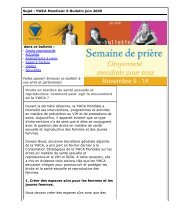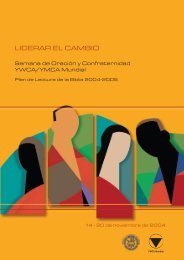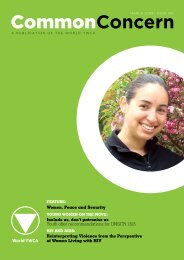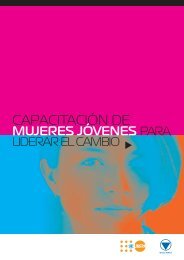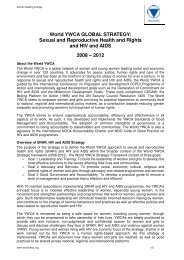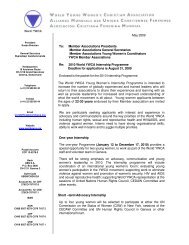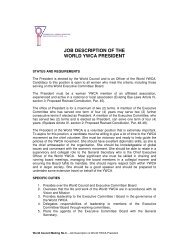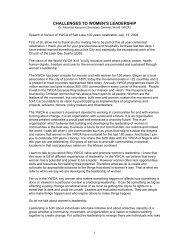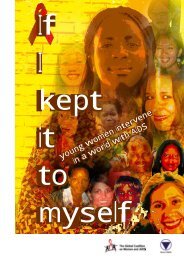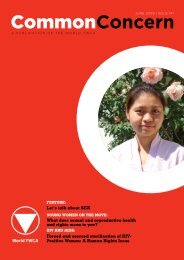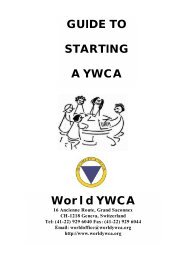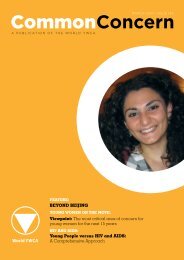UNAIDS Executive Director Dr Peter Piot.pdf - World YWCA
UNAIDS Executive Director Dr Peter Piot.pdf - World YWCA
UNAIDS Executive Director Dr Peter Piot.pdf - World YWCA
You also want an ePaper? Increase the reach of your titles
YUMPU automatically turns print PDFs into web optimized ePapers that Google loves.
Speech by <strong>Dr</strong> <strong>Peter</strong> <strong>Piot</strong>, <strong>Executive</strong> <strong>Director</strong> of <strong>UNAIDS</strong>, Under Secretary-<br />
General of the United Nations<br />
International Women’s Summit<br />
5 July 2007, Nairobi<br />
Mr President. It is good to be back in Kenya and to see that you have made real progress in the<br />
response to AIDS. Thank you for your leadership.<br />
Thank you Musumbi and Monica and the <strong>World</strong> <strong>YWCA</strong> for your amazing leadership and for<br />
bringing us all together. Thank you ICW for persevering with what has often been a lonely battle.<br />
Thank you my co-speakers for your leadership.<br />
This event marks a vibrant moment on women and AIDS. Such a momentum is desperately<br />
needed, because the most significant development of the AIDS epidemic is its growing<br />
feminization. What entered history 25 years ago as a disease of white gay men is now<br />
increasingly affecting women all over the world.<br />
Take our host country – an astonishing 67% of people living with HIV are women and girls. This<br />
trend is transforming the AIDS epidemic and it must now equally transform our response to AIDS.<br />
As we heard from <strong>Dr</strong> Margaret Chan, there is real progress in our response to AIDS. We are<br />
starting to see a return on the massive investments on AIDS of the last few years. Finally!<br />
But, it is all going too slowly. If we continue at the current pace, there will be fewer than 5 million<br />
people on treatment by 2010 - just over half of the people who will need it. That is a long way<br />
from universal access!<br />
There is also encouraging news on the HIV prevention front. Across East Africa, the Caribbean<br />
and in Cambodia and Southern India, HIV infection levels are declining.<br />
However, HIV incidence rates remain unacceptably high in many populations, with every day<br />
12,000 people becoming infected - half of them women.<br />
And for every person who starts on antiretroviral therapy, another 6 become infected with HIV.<br />
This is not acceptable and this is not sustainable.<br />
This also means that queues for access to antiretroviral treatment will just get longer and longer,<br />
pointing to an urgent need to reassess and revitalize HIV prevention.<br />
So we need to do much better on both HIV treatment and prevention, and to make the<br />
commitment by all UN member states to universal access a reality.<br />
What will it take when it comes to women?<br />
Let me highlight four challenges we all need to work on.<br />
The first is stronger and sustained leadership.<br />
The Global Coalition on Women and AIDS has spelled out a clear agenda, which calls for three<br />
basics:<br />
- serving women’s rights<br />
- investing more in AIDS programmes that work for women<br />
- allocating more seats for women at decision-making tables
These basics are essential to overcome the huge barriers that women face in participating in the<br />
AIDS response.<br />
All this will require stronger leadership on women and AIDS at so many levels. I see this<br />
leadership growing. I saw it yesterday at the Positive Women’s Forum. From the many grass<br />
roots women’s organizations, networks of people living with HIV around the world, the African and<br />
Latin American First Ladies (Doña Xiamara of Honduras), business women’s initiative such as in<br />
Kenya, women Ministers of Health and of course the <strong>YWCA</strong>.<br />
It also means giving a voice to the voiceless – one of the many things I like about this conference!<br />
Here in this room is probably the most diverse gathering of women’s groups I have seen since the<br />
Beijing Women’s Conference in 1995, and the one in Nairobi 10 years earlier in this very building.<br />
In order to be effective as advocates, we not only need to challenge and denounce, but we also<br />
need to come up with practical solutions.<br />
This brings me to my second challenge: We need to do better in terms of action that is relevant<br />
for women.<br />
The first question we need to ask for every AIDS activity is of course: does it pass the test for<br />
women? And let’s not forget that there is no such thing as a gender neutral programme.<br />
For example, we can no longer afford to promote condoms with messages that at the same time<br />
promote aggressive male sexual behaviour, or to introduce large scale HIV testing or male<br />
circumcision without incorporating implications for women, or scale up HIV treatment without<br />
ensuring gender equality in access.<br />
“Does it pass the test for women?” also means that female-specific actions and methods such as<br />
the female condom must be fully resourced. This includes boosting research on microbicides. It<br />
also means that women must be at the table whenever AIDS programmes are designed,<br />
implemented and evaluated.<br />
Thirdly, what about us men?<br />
As far as I’m concerned, we have no choice but to embrace gender equality, because I firmly<br />
believe that the cost to men of traditional masculinity is high – compromising men’s health and<br />
well being.<br />
As a minimum, let’s all speak loudly that we will accept nothing less than zero tolerance for<br />
gender-based violence. Data show that most men agree to this.<br />
There is now a solid evidence base emerging on what works in terms of male attitudes, beliefs<br />
and behaviour as related to gender.<br />
I am thinking about Instituto Promundo in Brazil, Stepping Stones, the member of the new global<br />
Men Engage Coalition, and so many others.<br />
What is needed now is a rapid expansion of these small initiatives.<br />
We, men, can be your partners, but certainly on this one, women need to be in the lead, because<br />
ultimately, this is about power.<br />
My 4 th point is that it is high time we took a long term view on the AIDS epidemic. The sobering<br />
reality is that we will need to sustain an effective AIDS response over many decades. This will<br />
require sustained and exceptional leadership of all of us.
The need for such a long term view is obvious when we consider the future of those of us who<br />
are on antiretroviral treatment.<br />
How will we pay for this? Will the 2 nd , 3 rd , 4 th line ARVs be available?<br />
But it is the feminization of the epidemic and the reality that every single day brings new HIV<br />
infections that impose we think and act beyond pure crisis management.<br />
We will not be able to stop this epidemic if we don’t address its drivers in the first place - gender<br />
inequality and its consequences for women.<br />
This will require that we go well beyond the gender rhetoric and be more operational in what we<br />
promote.<br />
We also must build some firm pragmatic alliances with national gender equality and women<br />
empowerment programmes.<br />
Dear friends, this brings me back to our agenda for this week.<br />
This conference is emerging as a defining moment in the global response to AIDS, particularly<br />
when it comes to women and AIDS.<br />
Our coming together of positive women, faith-based women’s organizations, women and AIDS<br />
activists, and the broader women’s movements, is creating a powerful synergy.<br />
Here is the unstoppable, brilliant alliance that will successfully challenge both the AIDS epidemic<br />
and the inequality that continues to put women and girls at risk for HIV.<br />
Women’s groups are now increasingly committed to the fight against AIDS. It is now up to the<br />
AIDS movement to demonstrate commitment to address gender inequality and support women’s<br />
groups to address the feminization of the epidemic.<br />
This is a time in the history of AIDS to connect the dots between AIDS and gender equality, AIDS<br />
and poverty alleviation, AIDS and harmonization.<br />
Finally, few issues illustrate so dramatically the deadly consequences of inequality as AIDS does.<br />
As an optimist, I am a firm believer that catastrophes also offer opportunities.<br />
So let’s turn the paradigm upside down and make sure that the response to AIDS leverages a<br />
fatal blow to the disempowerment of women.<br />
If it worked for gay rights, it must work for women’s rights!<br />
On behalf of <strong>UNAIDS</strong>, the 10 agencies that make of the Joint UN Programme on HIV/AIDS, I<br />
reiterate my own commitment to fully support the Nairobi Declaration coming out of this Summit.<br />
I wish you a productive and inspiring conference.<br />
Pamoja twanganize ukinwi.<br />
Together, we will defeat AIDS.<br />
Ahsante sana.





